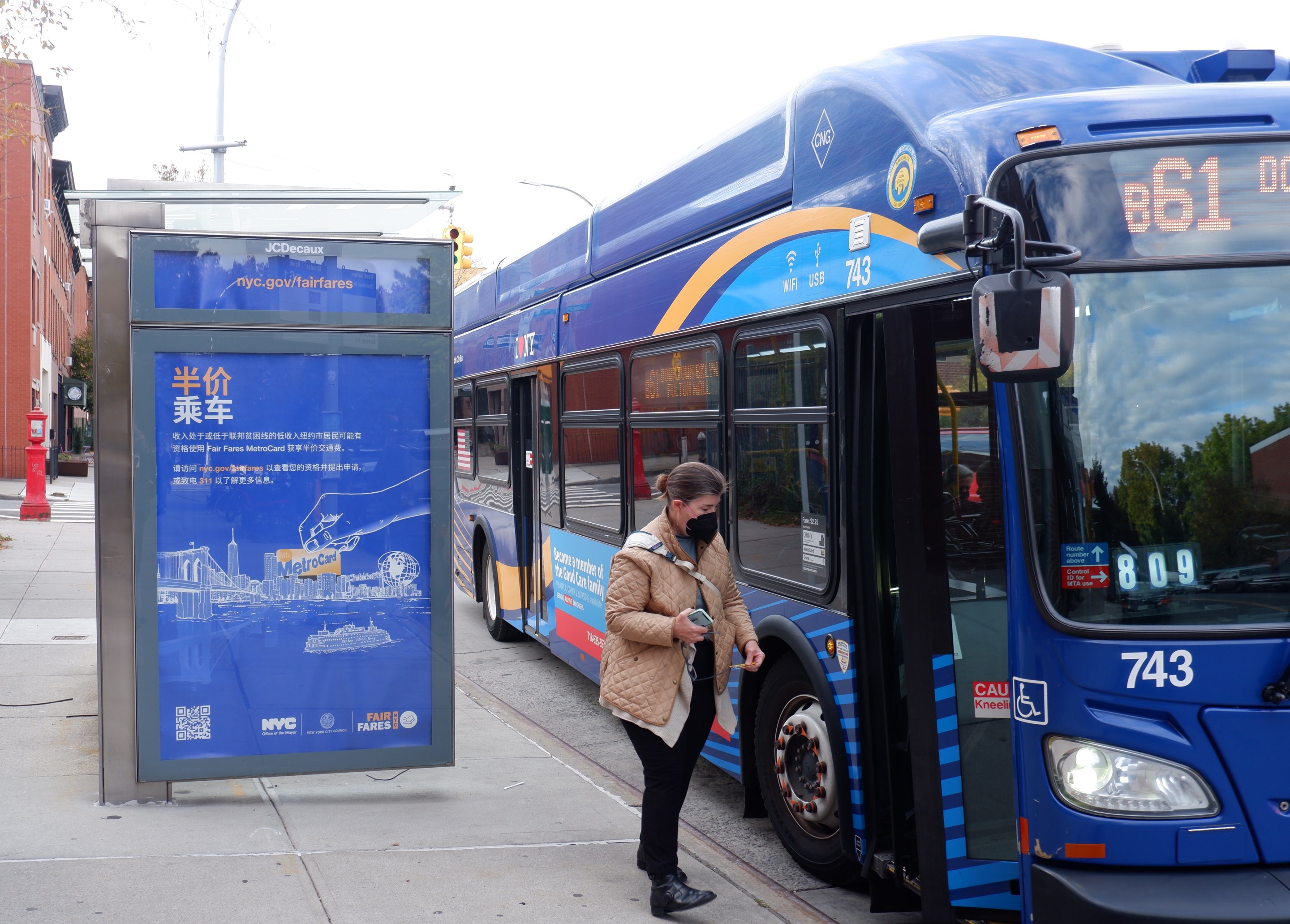The MTA’s fare evasion obsession is slowing down your bus.
City buses have been equipped with tech to allow all-door boarding since the end of 2020 — but transit officials won't pull the trigger on the bus-quickening policy until they've unveiled unspecified new fare evasion strategies, an MTA spokesperson told Streetsblog last week.
"The timing of systemwide all-door boarding will depend on various factors," the spokesperson said via email. "New measures to curb fare evasion on buses, which will be announced later this year, will also be critical to expanding all-door boarding."
Fare evasion on local buses hit 36 percent in the fourth quarter of 2022. according to the MTA's most recent data — up from 23 percent in the fourth quarter of 2020.
MTA leaders have repeatedly cited fare evasion among their concerns regarding all-door boarding, dating back to before the MTA committed to the policy citywide in August 2021. The policy has led to reductions in the time it takes to load and unload passengers on the MTA's own Select Bus Service routes, but MTA CEO Janno Lieber has nevertheless dismissed those well-established benefits as a mere a “hypothesis.” A pilot announced in 2021 to roll out the policy on 4 percent of local bus routes never materialized.
Fare evasion, meanwhile, has been near the top of Lieber's agenda since a speech last April 26 pledging to form a blue ribbon panel to address the authority's fare-beating rates. The panel's report, initially slated to come out in Fall 2022, has yet to be released. Asked last month why the document remained under wrap, Lieber tersely replied that it was "printing":
As the wait for the panel's recommendations drags on, riders remain unable unable to use a boarding practice that "dramatically speeds up service and improves reliability," according to the National Association of City Transportation Officials.
By delaying the initial pilot, the MTA is missing an opportunity to study the policy's effectiveness and potential shortfalls, according to former MTA official Stephen Maples, who worked on fare evasion issues until he left the authority in 2022.
"The point of a pilot is to say, 'Alright, let's see where we are, let's see how usage goes,'" Maples told Streetsblog last week. "It will be a little bit messy. But that's why it's a pilot. It wasn't as if that these things weren't anticipated."
Experience in other countries shows that making it easier to pay for transit actually increases the odds someone pays for it, the former MTA planner said.
"To the extent that the the literature is out there, what we do understand, in a very limited way, is that reducing the friction of getting on the bus — and reducing the friction of paying — increases compliance," Maples added. "Will that translate to New York City in the year 2023 ... I don't know, but again that's why the pilot is there."
All-door boarding has been possible on MTA buses since the agency finished adding tap-to-pay OMNY readers to every bus in its fleet at the end of 2020. The authority spokesman cited low OMNY use among bus riders as another "factor" holding up back-door boarding. Lieber has also spent the year since canceling the pilot pointing out that OMNY usage on the bus has hovered at around 20 percent of all bus riders, even as the usage has risen to over 40 percent of subway riders, according to MTA figures.
Yet while Lieber has used the persistently low OMNY uptake among bus riders as an excuse to deny them better services, advocates said he's got it backwards — and that turning on back-door OMNY readers on buses should actually lead to higher OMNY use among bus riders.
"The MTA needs a more proactive strategy to get bus riders to use OMNY," said Riders Alliance Director of Policy and Communication Danny Pearlstein. "The reactive strategy isn't working, and putting OMNY cards in riders' hands by doing a limited giveaway, or attaching the card to something else that riders use or doing outreach at major bus hubs is the obvious next step. Sitting back and waiting has run its course."
Bus riders were "promised" all door boarding years ago, noted Pearlstein — who said the MTA's slow-walking of the policy gives City Hall an excuse to slow-walk its own commitments to improve bus service like building out dedicated lanes.
"It would serve as something of a gauntlet to lay down to city officials who've pointed to all-door boarding as a reason buses are slow, even as the city hasn't completed its promised projects," he said.
"It would let the MTA say, 'We're pulling out all the stops,' and doesn't give the city any reason to point the finger."






